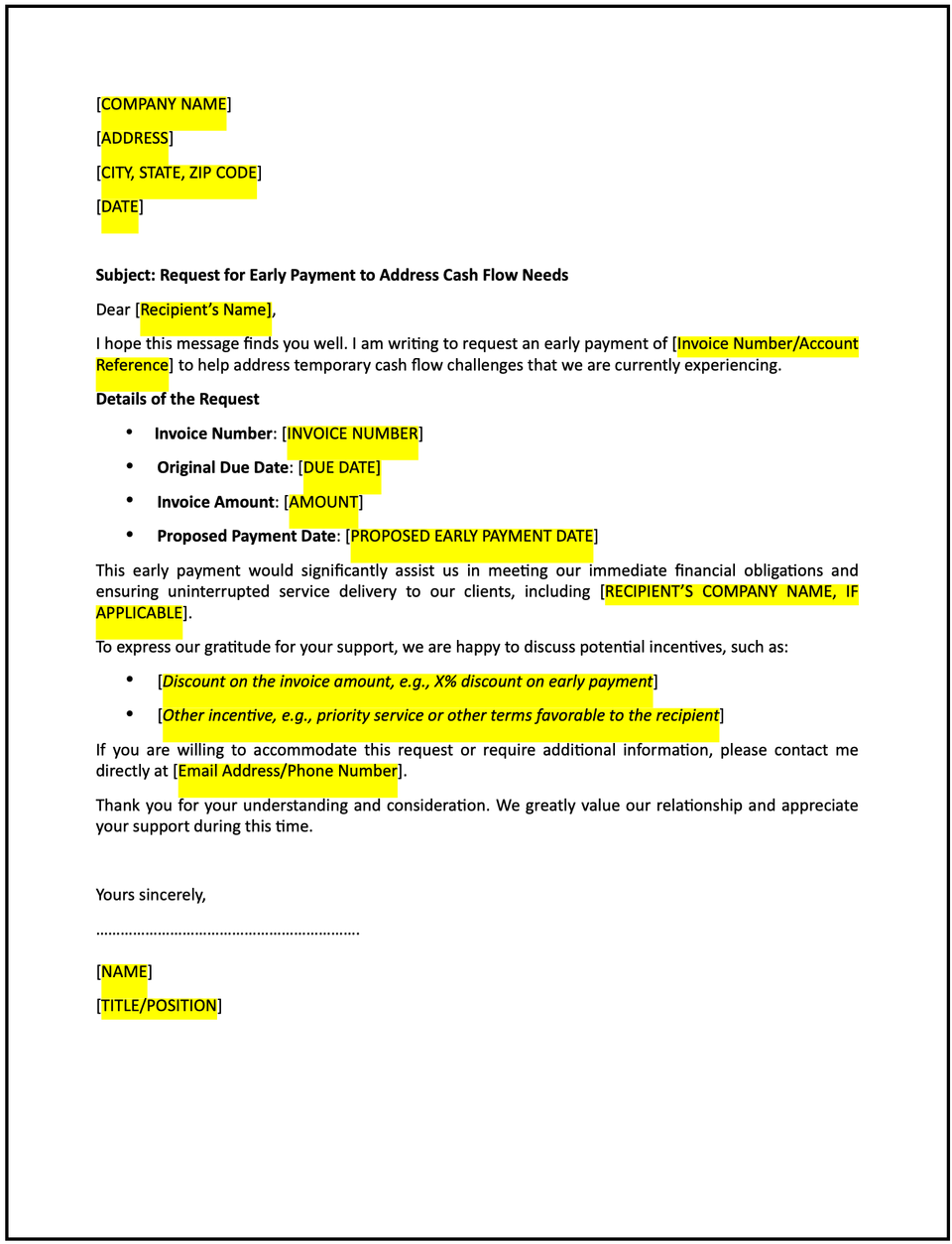Letter for early payment to resolve cash flow issues: Free template

Letter for early payment to resolve cash flow issues
A letter of request for early payment to resolve cash flow issues is a formal communication sent to clients, customers, or vendors to request an expedited payment for outstanding invoices. This letter outlines the reasons for the request, proposes a solution, and ensures a professional tone to maintain the relationship while addressing financial needs.
How to use this letter for early payment to resolve cash flow issues
- Open with an introduction: Address the recipient respectfully and state the purpose of the letter—requesting an early payment for outstanding invoices.
- Provide context: Briefly explain the circumstances, such as temporary cash flow challenges, and how an early payment can help resolve the situation.
- Specify the payment details: Clearly identify the invoice(s) for which you are requesting early payment, including invoice numbers, amounts, and due dates.
- Propose a solution: Offer an incentive, if applicable, such as a discount or benefit for early payment, to encourage cooperation.
- Reassure the recipient: Emphasize your commitment to fulfilling obligations and maintaining a strong business relationship.
- Request timely action: Politely ask the recipient to consider the request and confirm their willingness to proceed within a specified timeframe.
- Maintain a professional tone: Ensure the letter is clear, respectful, and focused on collaboration.
- Provide contact information: Include details for the recipient to reach out with questions or to discuss the request further.
Benefits of using a letter for early payment to resolve cash flow issues
This letter ensures a structured and professional way to request early payment while maintaining transparency and goodwill. Here’s how it helps:
- Promotes transparency: Clearly explaining the request builds trust and minimizes misunderstandings.
- Reflects professionalism: A well-crafted letter demonstrates respect and a commitment to maintaining the relationship.
- Encourages cooperation: Offering incentives fosters collaboration and goodwill.
- Supports financial management: Early payment helps alleviate cash flow constraints and ensures smooth operations.
- Maintains relationships: A polite and respectful approach preserves long-term partnerships.
Tips for writing an effective letter for early payment to resolve cash flow issues
- Be specific: Clearly identify the invoices in question and the requested payment timeline.
- Use professional language: Maintain a respectful tone to foster understanding and cooperation.
- Provide context: Briefly explain the reason for the request to build credibility and goodwill.
- Highlight benefits: If applicable, emphasize any incentives or mutual advantages for early payment.
- Request actionable next steps: Politely ask for confirmation or discussion of the proposed terms.
- Keep it concise: Focus on the key points while ensuring the tone is professional and collaborative.
Frequently asked questions (FAQs)
Q: What details should I include in this letter?
A: Include invoice numbers, amounts, due dates, reasons for the request, and any incentives offered for early payment.
Q: Should I personalize the letter?
A: Yes, addressing the recipient directly ensures clarity and demonstrates attentiveness.
Q: Who typically sends this letter?
A: Business owners, financial managers, or account representatives typically send this letter.
Q: How formal should this letter be?
A: The tone should be professional yet empathetic, focusing on collaboration and mutual understanding.
Q: When should this letter be sent?
A: Send the letter as soon as the need for early payment arises to allow sufficient time for discussion.
Q: Can this letter offer a payment plan for the recipient?
A: Yes, suggesting a flexible payment arrangement can demonstrate goodwill and increase the likelihood of cooperation.
Q: Is acknowledgment from the recipient required?
A: While not mandatory, requesting acknowledgment ensures the recipient is aware of and considering the request.
This article contains general legal information and does not contain legal advice. Cobrief is not a law firm or a substitute for an attorney or law firm. The law is complex and changes often. For legal advice, please ask a lawyer.


